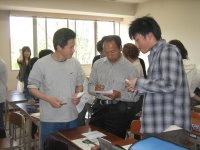Our First Practice Lesson!



Last Thursday in ETM3 we had two practice lessons. One group of teachers taught pages 16 and 17 from the first year New Horizon junior high school text book. The key sentences on these pages were "Is this ~?" "Is that ~ " . A graduate student from the Uygur Autonomous Region in China was nice enough to join us and let the teachers teach him some English! The list of the first group of teachers is below:
Happy days
Bear or Toshi?
Fantasista
Chocolate-ice-cream
Gakusei
The second group of teachers taught pages 36 and 37 of the first year New Horizon junior high school text book. Two Spanish teachers from Moriako were nice enough to come to the class and participate as students. The key sentence for pages 36 to 37 was "What do you have for breakfast?" The list of the second group of teacher is below:
Patapata
The Leo
Mibora
RIP
Elle
Mihotch
I asked each teacher to write a reflection on their blogs and the other members of ETM3 to comment on them. I am looking forward to reading the posts and comments. I have also written my comments on the lessons here.
Before the teachers taught, I had advised them to organize their lesson as below:
1. Warm-up
2. Review
3. Introduction of New Material: Usually a key sentence
4. Practice: A mixture of drilling and communicative activities
5. New Words: Introduce the wew words presented in the text
6. Reading: Practice the reading text in the textbook
7. Consolidation: Summarize and confirm what was studied
This structure came from the below teacher training book (in Japanese) for teachers at junior and senior high schools in Japan. I have found that the above style works well for doing a typical textbook lesson for first and second year junior high school classes. I do not know if this could all be covered in a typical high school class though.
米山朝二、杉山敬、多田茂. (2002). 『英語科教育実習ハンドブック』大修館.



